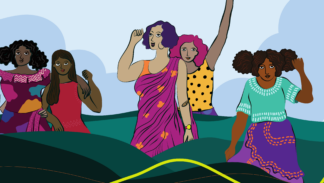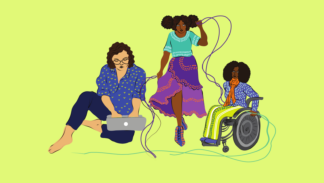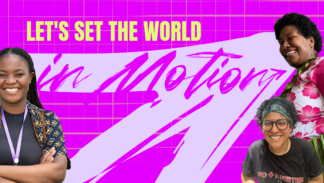Caring for the Movement
Providing Healing Spaces for Human Rights Defenders
Santo Tomás is a town in El Salvador that lies nestled against the El Porvenir Forest. Much of the forest is first growth, with trees older than the country itself. It is an integral part of this agricultural community—of its ecosystem, its identity, its way of life. In 2015, one of El Salvador’s largest companies cleared a swath of the forest, cutting down some 30,000 trees. They dried up nearby wells and streams, damaged crops, and displaced families in the process. The people of Santo Tomás were stunned. They were heartbroken. But they were not speechless.
Sonia Sánchez is a leader of the Movimiento de Mujeres de Santo Tomás, a local organization dedicated to the defense of sexual and reproductive rights, environmental justice, and violence prevention. And when Sonia saw the damage to her forest and to her community, she knew she had to speak up. She went on national radio to denounce the clearing of the El Porvenir Forest and the environmental damage it caused, and appeared on local television shows. Her advocacy did not go unnoticed.
First the company’s private security forces threatened her; then the company brought in their lawyers. They accused Sonia of defamation and slander, threatened her with jail time, and demanded $25,000 in damages. Sonia spent the next year of her life fighting these claims. The court battle was intense and purposefully drawn out, and though Sonia won, she left the courtroom exhausted and emotionally and physically depleted—burned out. The community still needed her, the women and girls in her organization still looked to her for leadership. But how do you lead if you can hardly stand? How can you make your voice heard if you cannot catch your breath?
For Global Fund for Women grantee partners Consorcio Oaxaca and IM-Defensoras, Sonia’s situation is a familiar one. Both organizations work with Woman Human-Rights Defenders (WHRDs), and both know these age-old strategies of oppression—the threats, harassment, violence, and isolation—that are intended by opposition forces to take away an organization’s leadership, to cripple a movement. This is why Consorcio Oaxaca and IM-Defensoras collaborated to create Casa La Serena, a dedicated space for defenders to recuperate and reflect.
After winning her court case, Sonia spent ten days at Casa La Serena. She participated in activities from group therapy to creative workshops to self-reflection. She met other Defenders like Carolina Ramirez from Veracruz, a woman whose ex-partner attempted to kill her, and who now works to protect other survivors of violence. “It has been a great gift to be here, to be able to find myself, meet others, and remind myself what a Defender is,” says Sonia. She left Casa La Serena, as each Defender does, with a long-term self-care plan, as well as the fresh conviction that self-care is collective care. As Sonia puts it, “This experience has allowed me to take care of myself in order to take care of others.”
Global Fund for Women has long supported Consorcio Oaxaca, IM-Defensoras, and other grantee partners as they protect Defenders and encourage individual and collective self-care. Global Fund for Women provided IM-Defensoras one of its first grants in 2011; the group now provides protection to over 100 defenders and their families. And Global Fund for Women has supported Consorcio Oaxaca since 2010. Today the group publishes feminist media, runs trainings and workshops, provides legal advice, and much more. In 2019, Casa La Serene and Global Fund for Women joined forced to support nine of our partners in Mesoamerica sending representatives to Casa La Serena to directly experience La Serena and develop a self-care plan. Each organization defends indigenous and Afro-descendant collective land from exploitation by state and multi-national companies; each faces threats and attacks for their work.
One of the demands of a Defender’s activism is that they care for themselves. Sonia’s activism continues, as does the harassment she endures as a WHRD—since her time at Casa la Serena, police have conducted two illegal searches of Sonia’s home. She continues to receive threats. But with the support of organizations like Consorcio Oaxaca and IM-Defensoras, women like Sonia and Carolina will continue to have the strength, the determination, and the clarity of vision they need to continue to fight for women, for girls, and for all of us.
It is very important that we as defenders have the opportunity— this revolutionary act—of taking care of ourselves.”Carolina Ramirez, woman human rights defender


